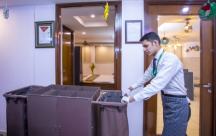July 20, 2023

Introduction
It is impossible to emphasise the significance of sustainability and environmental awareness in today’s society. Hotels are realising the need to implement environmentally friendly practises, notably in their housekeeping operations, as visitors’ awareness of their influence on the environment grows. Hotels may lessen their carbon footprint, save resources, and contribute to a better future by implementing sustainable activities. We’ll look at several important eco-friendly cleaning techniques that may be included into hotels in this post.
- Organic Cleaning Supplies – The usage of green cleaning solutions is one of the most important steps towards eco-friendly housekeeping. Traditional cleaning products frequently include dangerous chemicals that can harm the environment and human health. Hotels may reduce their environmental impact while still upholding high levels of cleanliness by switching to biodegradable, non-toxic, and eco-certified cleaning solutions.
- Conservation of water – A key component of sustainable housekeeping is water saving. Hotels may take a number of actions to reduce water use. Installing low-flow toilets, showerheads, and faucets may drastically cut down on water usage. Another successful tactic is to encourage visitors to reuse towels and linens by posting obvious signs and informing them of the advantages. Training housekeeping workers on effective water consumption habits may also significantly improve water saving efforts.
- Energy-Saving Techniques – Not only is it ethical to use less energy, but hotels may also benefit financially from doing so. By shutting off lights and electronics when not in use, properly insulating rooms to maintain ideal temperatures, and using natural lighting wherever available, housekeeping personnel may help the environment. By automatically altering lighting and HVAC systems based on occupancy, smart energy management systems may further optimise energy use.
- Management of Waste and Recycling – One of the most important aspects of eco-friendly housekeeping is efficient trash management. To guarantee the appropriate disposal of recyclable items such paper, plastic, glass, and aluminium, hotels might develop recycling programmes. Recycling initiatives may be actively supported by visitors and employees if recycling bins are strategically positioned around the site and there is clear signage explaining the process. By choosing bulk facilities, establishing digital communication systems, and embracing sustainable packaging techniques, hotels may further minimise waste output.
- Green Cleaning Techniques – There might be a significant environmental effect of laundry operations. Hotels may dramatically lower their energy and water usage by utilising washing equipment that is both water and energy efficient. To use less water and chemicals, it is also helpful to optimise laundry loads and use eco-friendly detergents. Further enhancing sustainability in housekeeping operations is looking into alternative laundry techniques like ozone or cold-water washing.
Conclusion
Eco-friendly housekeeping methods are not only a smart decision, but also a responsible one. Hotels may attract customers who care about the environment, lower operating expenses, and support global sustainability goals by implementing sustainable activities. An eco-friendlier approach to hotel housekeeping may be achieved by embracing green cleaning solutions, encouraging water and energy saving, putting in place efficient waste management and recycling programmes, and applying sustainable laundry practises. Hotels can offer a stronger guest experience while improving the environment by putting a priority on sustainability.

















